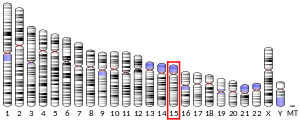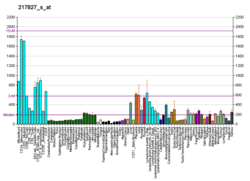SPG21: Difference between revisions
Content deleted Content added
m Citation maintenance. You can use this bot yourself! Please report any bugs. |
Importing Wikidata short description: Protein-coding gene in the species Homo sapiens (shortdescs-in-category) |
||
| (22 intermediate revisions by 14 users not shown) | |||
| Line 1: | Line 1: | ||
{{Short description|Protein-coding gene in the species Homo sapiens}} |
|||
<!-- The PBB_Controls template provides controls for Protein Box Bot, please see Template:PBB_Controls for details. --> |
|||
{{Infobox_gene}} |
|||
{{PBB_Controls |
|||
'''Maspardin''' is a [[protein]] that in humans is encoded by the ''SPG21'' [[gene]].<ref name="pmid11113139">{{cite journal | vauthors = Zeitlmann L, Sirim P, Kremmer E, Kolanus W | title = Cloning of ACP33 as a novel intracellular ligand of CD4 | journal = J Biol Chem | volume = 276 | issue = 12 | pages = 9123–32 |date=Mar 2001 | pmid = 11113139 | doi = 10.1074/jbc.M009270200 | doi-access = free }}</ref><ref name="pmid14564668">{{cite journal | vauthors = Simpson MA, Cross H, Proukakis C, Pryde A, Hershberger R, Chatonnet A, Patton MA, Crosby AH | title = Maspardin Is Mutated in Mast Syndrome, a Complicated Form of Hereditary Spastic Paraplegia Associated with Dementia | journal = Am J Hum Genet | volume = 73 | issue = 5 | pages = 1147–56 |date=Oct 2003 | pmid = 14564668 | pmc = 1180493 | doi = 10.1086/379522 }}</ref><ref name="entrez"/> |
|||
| update_page = yes |
|||
| require_manual_inspection = no |
|||
| update_protein_box = yes |
|||
| update_summary = yes |
|||
| update_citations = yes |
|||
}} |
|||
| ⚫ | The protein encoded by this gene was identified by a two-hybrid screen using CD4 as the bait. It binds to the hydrophobic C-terminal amino acids of CD4 which are involved in repression of T cell activation. The interaction with CD4 is mediated by the noncatalytic alpha/beta hydrolase fold domain of this protein. It is thus proposed that this gene product modulates the stimulatory activity of CD4.<ref name="entrez">{{cite web | title = Entrez Gene: SPG21 spastic paraplegia 21, maspardin (autosomal recessive, Mast syndrome)| url = https://www.ncbi.nlm.nih.gov/sites/entrez?Db=gene&Cmd=ShowDetailView&TermToSearch=51324}}</ref> |
||
<!-- The GNF_Protein_box is automatically maintained by Protein Box Bot. See Template:PBB_Controls to Stop updates. --> |
|||
{{GNF_Protein_box |
|||
| image = |
|||
| image_source = |
|||
| PDB = |
|||
| Name = Spastic paraplegia 21, maspardin (autosomal recessive, Mast syndrome) |
|||
| HGNCid = 20373 |
|||
| Symbol = SPG21 |
|||
| AltSymbols =; ACP33; BM-019; GL010; MAST |
|||
| OMIM = 608181 |
|||
| ECnumber = |
|||
| Homologene = 9603 |
|||
| MGIid = 106403 |
|||
| GeneAtlas_image1 = PBB_GE_SPG21_217827_s_at_tn.png |
|||
| Function = {{GNF_GO|id=GO:0042609 |text = CD4 receptor binding}} |
|||
| Component = {{GNF_GO|id=GO:0005829 |text = cytosol}} {{GNF_GO|id=GO:0030140 |text = trans-Golgi network transport vesicle}} |
|||
| Process = {{GNF_GO|id=GO:0050851 |text = antigen receptor-mediated signaling pathway}} |
|||
| Orthologs = {{GNF_Ortholog_box |
|||
| Hs_EntrezGene = 51324 |
|||
| Hs_Ensembl = ENSG00000090487 |
|||
| Hs_RefseqProtein = NP_057714 |
|||
| Hs_RefseqmRNA = NM_016630 |
|||
| Hs_GenLoc_db = |
|||
| Hs_GenLoc_chr = 15 |
|||
| Hs_GenLoc_start = 63042417 |
|||
| Hs_GenLoc_end = 63069304 |
|||
| Hs_Uniprot = Q9NZD8 |
|||
| Mm_EntrezGene = 27965 |
|||
| Mm_Ensembl = ENSMUSG00000032388 |
|||
| Mm_RefseqmRNA = NM_138584 |
|||
| Mm_RefseqProtein = NP_613050 |
|||
| Mm_GenLoc_db = |
|||
| Mm_GenLoc_chr = 9 |
|||
| Mm_GenLoc_start = 65258977 |
|||
| Mm_GenLoc_end = 65285461 |
|||
| Mm_Uniprot = Q9CQC8 |
|||
}} |
|||
}} |
|||
'''Spastic paraplegia 21, maspardin (autosomal recessive, Mast syndrome)''', also known as '''SPG21''', is a human [[gene]].<ref name="entrez">{{cite web | title = Entrez Gene: SPG21 spastic paraplegia 21, maspardin (autosomal recessive, Mast syndrome)| url = http://www.ncbi.nlm.nih.gov/sites/entrez?Db=gene&Cmd=ShowDetailView&TermToSearch=51324| accessdate = }}</ref> |
|||
==Interactions== |
|||
<!-- The PBB_Summary template is automatically maintained by Protein Box Bot. See Template:PBB_Controls to Stop updates. --> |
|||
SPG21 has been shown to [[Protein-protein interaction|interact]] with [[CD4]].<ref name=pmid11113139 /> |
|||
{{PBB_Summary |
|||
| section_title = |
|||
| ⚫ | |||
}} |
|||
==References== |
==References== |
||
{{reflist}} |
{{reflist}} |
||
==Further reading== |
==Further reading== |
||
{{refbegin | 2}} |
{{refbegin | 2}} |
||
*{{cite journal | vauthors=Cross HE, McKusick VA |title=The mast syndrome. A recessively inherited form of presenile dementia with motor disturbances |journal=Arch. Neurol. |volume=16 |issue= 1 |pages= 1–13 |year= 1967 |pmid= 6024251 |doi= 10.1001/archneur.1967.00470190005001}} |
|||
{{PBB_Further_reading |
|||
*{{cite journal | vauthors=Maruyama K, Sugano S |title=Oligo-capping: a simple method to replace the cap structure of eukaryotic mRNAs with oligoribonucleotides |journal=Gene |volume=138 |issue= 1–2 |pages= 171–4 |year= 1994 |pmid= 8125298 |doi=10.1016/0378-1119(94)90802-8 }} |
|||
| citations = |
|||
*{{cite journal |
*{{cite journal |vauthors=Suzuki Y, Yoshitomo-Nakagawa K, Maruyama K, etal |title=Construction and characterization of a full length-enriched and a 5'-end-enriched cDNA library |journal=Gene |volume=200 |issue= 1–2 |pages= 149–56 |year= 1997 |pmid= 9373149 |doi=10.1016/S0378-1119(97)00411-3 }} |
||
*{{cite journal | |
*{{cite journal |vauthors=Strausberg RL, Feingold EA, Grouse LH, etal |title=Generation and initial analysis of more than 15,000 full-length human and mouse cDNA sequences |journal=Proc. Natl. Acad. Sci. U.S.A. |volume=99 |issue= 26 |pages= 16899–903 |year= 2003 |pmid= 12477932 |doi= 10.1073/pnas.242603899 | pmc=139241 |bibcode=2002PNAS...9916899M |doi-access=free }} |
||
*{{cite journal | |
*{{cite journal |vauthors=Ota T, Suzuki Y, Nishikawa T, etal |title=Complete sequencing and characterization of 21,243 full-length human cDNAs |journal=Nat. Genet. |volume=36 |issue= 1 |pages= 40–5 |year= 2004 |pmid= 14702039 |doi= 10.1038/ng1285 |doi-access= free }} |
||
*{{cite journal |
*{{cite journal |vauthors=Gerhard DS, Wagner L, Feingold EA, etal |title=The Status, Quality, and Expansion of the NIH Full-Length cDNA Project: The Mammalian Gene Collection (MGC) |journal=Genome Res. |volume=14 |issue= 10B |pages= 2121–7 |year= 2004 |pmid= 15489334 |doi= 10.1101/gr.2596504 | pmc=528928 }} |
||
*{{cite journal |
*{{cite journal |vauthors=Rual JF, Venkatesan K, Hao T, etal |title=Towards a proteome-scale map of the human protein-protein interaction network |journal=Nature |volume=437 |issue= 7062 |pages= 1173–8 |year= 2005 |pmid= 16189514 |doi= 10.1038/nature04209 |bibcode=2005Natur.437.1173R |s2cid=4427026 }} |
||
*{{cite journal | author=Simpson MA, Cross H, Proukakis C, ''et al.'' |title=Maspardin is mutated in mast syndrome, a complicated form of hereditary spastic paraplegia associated with dementia. |journal=Am. J. Hum. Genet. |volume=73 |issue= 5 |pages= 1147–56 |year= 2004 |pmid= 14564668 |doi= }} |
|||
*{{cite journal | author=Ota T, Suzuki Y, Nishikawa T, ''et al.'' |title=Complete sequencing and characterization of 21,243 full-length human cDNAs. |journal=Nat. Genet. |volume=36 |issue= 1 |pages= 40–5 |year= 2004 |pmid= 14702039 |doi= 10.1038/ng1285 }} |
|||
*{{cite journal | author=Gerhard DS, Wagner L, Feingold EA, ''et al.'' |title=The status, quality, and expansion of the NIH full-length cDNA project: the Mammalian Gene Collection (MGC). |journal=Genome Res. |volume=14 |issue= 10B |pages= 2121–7 |year= 2004 |pmid= 15489334 |doi= 10.1101/gr.2596504 }} |
|||
*{{cite journal | author=Rual JF, Venkatesan K, Hao T, ''et al.'' |title=Towards a proteome-scale map of the human protein-protein interaction network. |journal=Nature |volume=437 |issue= 7062 |pages= 1173–8 |year= 2005 |pmid= 16189514 |doi= 10.1038/nature04209 }} |
|||
}} |
|||
{{refend}} |
{{refend}} |
||
{{gene-15-stub}} |
{{gene-15-stub}} |
||
Latest revision as of 02:06, 4 March 2023
| SPG21 | |||||||||||||||||||||||||||||||||||||||||||||||||||
|---|---|---|---|---|---|---|---|---|---|---|---|---|---|---|---|---|---|---|---|---|---|---|---|---|---|---|---|---|---|---|---|---|---|---|---|---|---|---|---|---|---|---|---|---|---|---|---|---|---|---|---|
| Identifiers | |||||||||||||||||||||||||||||||||||||||||||||||||||
| Aliases | SPG21, ACP33, GL010, MAST, BM-019, spastic paraplegia 21 (autosomal recessive, Mast syndrome), maspardin, ABHD21, SPG21 abhydrolase domain containing, maspardin | ||||||||||||||||||||||||||||||||||||||||||||||||||
| External IDs | OMIM: 608181; MGI: 106403; HomoloGene: 9603; GeneCards: SPG21; OMA:SPG21 - orthologs | ||||||||||||||||||||||||||||||||||||||||||||||||||
| |||||||||||||||||||||||||||||||||||||||||||||||||||
| |||||||||||||||||||||||||||||||||||||||||||||||||||
| |||||||||||||||||||||||||||||||||||||||||||||||||||
| |||||||||||||||||||||||||||||||||||||||||||||||||||
| |||||||||||||||||||||||||||||||||||||||||||||||||||
| Wikidata | |||||||||||||||||||||||||||||||||||||||||||||||||||
| |||||||||||||||||||||||||||||||||||||||||||||||||||
Maspardin is a protein that in humans is encoded by the SPG21 gene.[5][6][7]
The protein encoded by this gene was identified by a two-hybrid screen using CD4 as the bait. It binds to the hydrophobic C-terminal amino acids of CD4 which are involved in repression of T cell activation. The interaction with CD4 is mediated by the noncatalytic alpha/beta hydrolase fold domain of this protein. It is thus proposed that this gene product modulates the stimulatory activity of CD4.[7]
Interactions[edit]
SPG21 has been shown to interact with CD4.[5]
References[edit]
- ^ a b c GRCh38: Ensembl release 89: ENSG00000090487 – Ensembl, May 2017
- ^ a b c GRCm38: Ensembl release 89: ENSMUSG00000032388 – Ensembl, May 2017
- ^ "Human PubMed Reference:". National Center for Biotechnology Information, U.S. National Library of Medicine.
- ^ "Mouse PubMed Reference:". National Center for Biotechnology Information, U.S. National Library of Medicine.
- ^ a b Zeitlmann L, Sirim P, Kremmer E, Kolanus W (Mar 2001). "Cloning of ACP33 as a novel intracellular ligand of CD4". J Biol Chem. 276 (12): 9123–32. doi:10.1074/jbc.M009270200. PMID 11113139.
- ^ Simpson MA, Cross H, Proukakis C, Pryde A, Hershberger R, Chatonnet A, Patton MA, Crosby AH (Oct 2003). "Maspardin Is Mutated in Mast Syndrome, a Complicated Form of Hereditary Spastic Paraplegia Associated with Dementia". Am J Hum Genet. 73 (5): 1147–56. doi:10.1086/379522. PMC 1180493. PMID 14564668.
- ^ a b "Entrez Gene: SPG21 spastic paraplegia 21, maspardin (autosomal recessive, Mast syndrome)".
Further reading[edit]
- Cross HE, McKusick VA (1967). "The mast syndrome. A recessively inherited form of presenile dementia with motor disturbances". Arch. Neurol. 16 (1): 1–13. doi:10.1001/archneur.1967.00470190005001. PMID 6024251.
- Maruyama K, Sugano S (1994). "Oligo-capping: a simple method to replace the cap structure of eukaryotic mRNAs with oligoribonucleotides". Gene. 138 (1–2): 171–4. doi:10.1016/0378-1119(94)90802-8. PMID 8125298.
- Suzuki Y, Yoshitomo-Nakagawa K, Maruyama K, et al. (1997). "Construction and characterization of a full length-enriched and a 5'-end-enriched cDNA library". Gene. 200 (1–2): 149–56. doi:10.1016/S0378-1119(97)00411-3. PMID 9373149.
- Strausberg RL, Feingold EA, Grouse LH, et al. (2003). "Generation and initial analysis of more than 15,000 full-length human and mouse cDNA sequences". Proc. Natl. Acad. Sci. U.S.A. 99 (26): 16899–903. Bibcode:2002PNAS...9916899M. doi:10.1073/pnas.242603899. PMC 139241. PMID 12477932.
- Ota T, Suzuki Y, Nishikawa T, et al. (2004). "Complete sequencing and characterization of 21,243 full-length human cDNAs". Nat. Genet. 36 (1): 40–5. doi:10.1038/ng1285. PMID 14702039.
- Gerhard DS, Wagner L, Feingold EA, et al. (2004). "The Status, Quality, and Expansion of the NIH Full-Length cDNA Project: The Mammalian Gene Collection (MGC)". Genome Res. 14 (10B): 2121–7. doi:10.1101/gr.2596504. PMC 528928. PMID 15489334.
- Rual JF, Venkatesan K, Hao T, et al. (2005). "Towards a proteome-scale map of the human protein-protein interaction network". Nature. 437 (7062): 1173–8. Bibcode:2005Natur.437.1173R. doi:10.1038/nature04209. PMID 16189514. S2CID 4427026.





